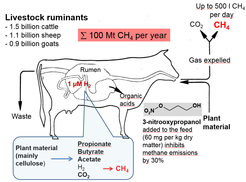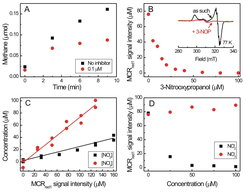Mode of action uncovered for the specific reduction of methane emissions from ruminants by the small molecule 3-nitrooxypropanol
Scientist at DSM Nutritional Products, Basel, Switzerland, and at the Max Planck Institute for Terrestrial Microbiology in Marburg, Germany, have unraveled the mechanism of how the small molecule 3-nitrooxypropanol (3-NOP) inhibits methanogenesis in ruminants.
Within the last 200 years the concentration of the atmospheric greenhouse-gas methane has tripled and domesticated ruminants have contributed significantly to this increase. Therefore, the recent finding that 3-nitrooxypropanol (3-NOP) can persistently decrease enteric methane emission from livestock without apparent negative side effects may help mitigate anthropogenic climate change (Figure 1).

Figure 1 | Methane formation in the rumen of a dairy cow and its inhibition by 3-nitrooxypropanol (3-NOP). The H2 concentration in the rumen is near 1 µM (0.14% H2 in the gas phase).
We could now show with in silico-, in vitro- and in vivo experiments that 3-NOP specifically targets methyl-coenzyme M reductase (MCR). The nickel enzyme, which is only active when its Ni is in the +1 oxidation state, catalyzes the methane forming step in the rumen fermentation. Molecular docking revealed that 3-NOP binds into the active site of MCR with its easy to reduce nitrate group in electron-transfer distance to Ni(I). With purified MCR we found that 3-NOP, at µM concentrations, indeed inactivates MCR by oxidation of its active site nickel(I) (Figure 2B). Concomitantly, the nitrate ester was reduced to nitrite, which at µM concentrations also inactivated MCR by Ni(I) oxidation (Figure 2D). With pure cultures it is demonstrated that 3-NOP, at µM concentrations, inhibits growth of methanogenic archaea but not that of the non-methanogenic bacteria in the rumen. At the very low concentrations required to inhibit methanogenesis in vivo, 3-NOP appears to be toxic only to methanogens and thus to be the ideal inhibitor of ruminant-methanogenesis.

Figure 2 | Experiments with purified methyl-coenzyme M reductase (MCR) from M. marburgensis. (A) Effect of 3-NOP on the MCR activity; (B) Effect of 3-NOP on the EPR signals MCRred1 (78µM) and MCRox1 (4 µM). The spectrum (inset) remaining after complete MCR inactivation is that of MCRox1. (C) Formation of nitrite and nitrate upon inactivation of MCR with 3-NOP. (D) Effect of nitrite and nitrate on the EPR signal MCRred1.
Reference
Evert. C. Duin, Tristan Wagner, Seigo Shima, Divya Prakash, Bryan Cronin, David R. Yáñez-Ruiz, Stephane Duval, Robert Rümbeli, René T. Stemmler, Rudolf K. Thauer, Maik Kindermann (2016) Proc. Natl. Acad. Sci. USA. Early Edition. www.pnas.org/cgi/doi/10.1073/pnas.1600298113






![<p>Discovery of [Fe]-hydrogenase in bacteria opens new possibilities for conversion of hydrogen</p>](/506336/original-1555497672.jpg?t=eyJ3aWR0aCI6MzYwLCJoZWlnaHQiOjI0MCwiZml0IjoiY3JvcCIsImZpbGVfZXh0ZW5zaW9uIjoianBnIiwib2JqX2lkIjo1MDYzMzZ9--d3d7c57e064104c2acc573916156127d6bedd85b)


![Protection of [Fe]-hydrogenase](/416905/teaser-1561027823.jpg?t=eyJ3aWR0aCI6MzYwLCJoZWlnaHQiOjI0MCwiZml0IjoiY3JvcCIsImZpbGVfZXh0ZW5zaW9uIjoianBnIiwib2JqX2lkIjo0MTY5MDV9--6ea496a03c86ba3d98a19e05aac63809917fe800)



